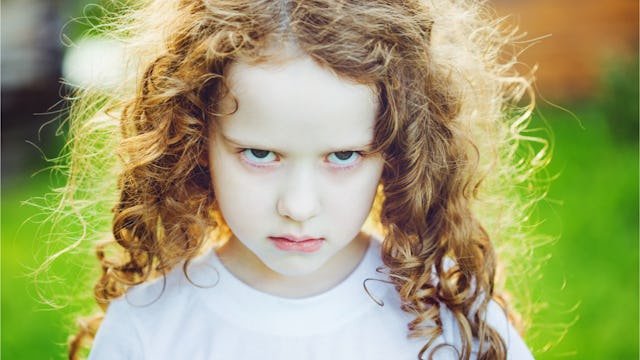Even The Worst-Behaved Kids Deserve Our Empathy

Let’s just be clear: Acknowledging the way a child feels is not spoiling them or indulging bad behavior. The old-fashioned argument that showing any sort of kindness to a misbehaving child encourages them to repeat their bad behavior simply isn’t true.
Kids act out when they feel threatened, sad, angry, or overwhelmed. That doesn’t make them bad people or undeserving of our love and understanding. Showing them empathy helps them manage the feelings that caused the behavior in the first place, which is completely different than encouraging it.
A child’s feelings are separate from their actions. Addressing them separately makes sense, but it isn’t always easy.
When my 6-year-old stomped angrily into the kitchen the other day because she couldn’t find her new favorite rainbow-dotted stuffed animal leopard and accused me of hiding it, I quickly went from annoyed to defensive and angry. I was tired and trying to get dinner started. I wanted to shoo her sassy ass right out of the room, tell her to chill out and be done with the whole episode.
Instead, I took in her flushed little face. Tears spilled down her cheeks even as she tried valiantly to hold onto her furious scowl. Whatever this was about, it clearly felt huge and sad to my little girl. What she needed from me was empathy, not a frustrated dismissal.
Responding with empathy means acknowledging your kid’s feelings no matter what kind of behavior they’re exhibiting, even when that behavior is pushing all your buttons. The idea is to set aside your own immediate reaction to the situation and focus on how your kid is feeling rather than what she’s doing. Her behavior might be totally off the wall, but the feelings that caused that behavior can be intense and she probably needs help making sense of them.
Offering kids empathy instead of countering with exasperation or hostility is not always our default response. It’s hard to actively put someone else’s feelings before our own. Even when we love that person more than anyone else.
When our kids aren’t behaving according to plan or they’re just acting like outright jerks, our go-to isn’t always empathy. I know for me, it’s more likely to be frustration, defensiveness, or doing whatever it takes to make them stop. In fact, I often start feeling some of the same emotions my kids are in the same moment. That’s exactly when I could use a little understanding myself. Why would it be any different for my kids?
Growing up is hard. As a little kid, you don’t get to make many choices. You’re told what to eat, what to wear, and where you need to be and when. You have to rely on adults for food, transportation, and the iPad password. You’re still learning how the world works and how you’re expected to behave in different situations. Older kids grapple with shifting hormones and school pressure. Emotions can be scary and overwhelming for a child of any age.
Telling our kids to just stop crying or that the hurt they feel isn’t “that bad” is putting our own value on feelings that don’t belong to us. I don’t want my kids to be ashamed of their feelings or think they need to hide or avoid them. It can be stressful to be around kids when they’re sad or angry. It’s not wrong to want your child to stop experiencing difficult feelings; it just isn’t all that helpful to diffuse them by discounting them.
It might be a faster way to bring us back to our own comfort zone, but it doesn’t help our kids learn strategies for managing their emotions. It isn’t up to us to judge the importance of our kids’ feelings. They are what they are, whether we like them or not.
I’m not perfect. I don’t always walk the walk, but I try to. While it’s sometimes difficult to focus on my child’s feelings instead of my own, when I meet her fury or despair with compassion, it always diffuses both of us. Whatever emotions her tantrum or crying jag might have triggered in me fade when I see her pain and overwhelm. The simple exercise of putting myself in her place literally makes my heart ache. If showing her empathy helps ease her pain, you better believe that’s what I’m going to do next — even when the behavior that goes along with those feelings isn’t okay.
That’s doesn’t mean I ignore unacceptable behavior, like rudeness, name-calling, or physical harm. I always talk to my children about it, but only when everyone, including me, is calm. That means handling whatever feelings I have so I can ask my child about hers and figure out what she needs. Jumping straight to her behavior ignores her feelings and always makes the problem worse.
Heaping on the consequences when a child isn’t fully aware of or comfortable with their emotions first just makes everyone more upset. Offering her my understanding, however challenging that might be in the moment, teaches her to manage her feelings, and over time, builds her emotional resilience.
It also shows her what empathy looks like.
In a world where angry rejection and violent responses make the headlines almost daily, modeling empathy for our kids is much needed. Showing them empathy isn’t a parenting weakness. It isn’t giving in to their tirades or acquiescing every time they whine and cry. It’s showing them we understand how intense some of those little kid feelings can be and that no matter how bad they feel, they’re always loved.
This article was originally published on